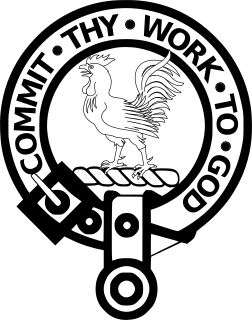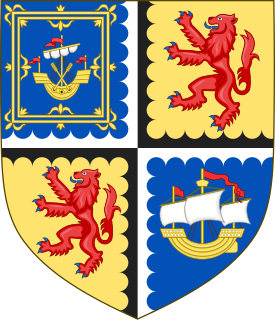Related Research Articles

Lord Sinclair is a title in the Peerage of Scotland. According to James Balfour Paul's The Scots Peerage, volume VII published in 1910, the first person to be styled Lord Sinclair was William Sinclair, 3rd Earl of Orkney and 1st Earl of Caithness. However, according to Roland Saint-Clair writing in the late 19th century, William Sinclair's father, Henry II Sinclair, Earl of Orkney, who died in 1420, is the first person recorded as Lord Sinclair by public records.

Clan Sinclair is a Highland Scottish clan which holds the lands of Caithness, the Orkney Islands, and the Lothians. The chiefs of the clan were the Barons of Roslin and later the Earls of Orkney and Earls of Caithness. The Sinclairs are believed to have come from Normandy to England during the Norman conquest of England, before arriving in Scotland in the 11th century. The Sinclairs supported the Scottish Crown during the Scottish–Norwegian War and the Wars of Scottish Independence. The chiefs were originally Barons of Roslin, Midlothian and William Sinclair, 1st Earl of Caithness and Baron of Roslin founded the famous Rosslyn Chapel in the 15th century. He split the family lands, disinheriting his eldest son from his first marriage, William, who inherited the title of Lord Sinclair, instead giving the lands of Caithness to the second son from his second marriage, William Sinclair, 2nd Earl of Caithness, in 1476, and the lands at Roslin to his eldest son from his second marriage, Sir Oliver Sinclair. In the 16th century the Sinclairs fought against England during the Anglo-Scottish Wars and also feuded with their neighbors the Clan Sutherland. During the Jacobite rising of 1715 the Sinclairs supported the Jacobite cause, but during the Jacobite rising of 1745, while the clan largely had Jacobite sympathies, their chief, the Earl of Caithness, supported the British-Hanoverian Government. The current chief is Malcolm Sinclair, 20th Earl of Caithness.
Henry II Sinclair, Earl of Orkney was the Jarl (Earl) of Orkney, Baron of Roslin and Pantler of Scotland. According to Roland Saint-Clair writing in the late 19th century, Henry Sinclair was also the first of his family to hold the title of Lord Sinclair.

Baron of Roslin or Rosslyn was a Scottish feudal barony held by the St Clair or Sinclair family.

William Sinclair was a nobleman, the 2nd Earl of Caithness and chief of the Clan Sinclair, a Scottish clan of the Scottish Highlands.

William St. Clair, 6th Baron of Roslin was a Scottish nobleman of the late 13th and early 14th centuries.

William St Clair was a Scottish noble and by tradition the 8th Baron of Roslin.

Henry Sinclair was a Scottish noble and the 4th Lord Sinclair. In The Scots Peerage by James Balfour Paul he is designated as the 3rd Lord Sinclair, but historian Roland Saint-Clair designates him the 4th Lord Sinclair and references this to an Act of the Scottish Parliament in which he was made Lord Sinclair based on his descent from his great-grandfather, Henry II Sinclair, Earl of Orkney, the first Lord Sinclair. Bernard Burke, in his a Genealogical and Heraldic Dictionary of the Peerage and Baronetage of the British Empire, agrees with Roland Saint-Clair and says that Henry Sinclair was "in reality" the fourth holder of the title of Lord Sinclair.

William St Clair was a Scottish nobleman and the 14th Baron of Roslin.

William Sinclair was a Scottish nobleman and the 5th Lord Sinclair. In The Scots Peerage by James Balfour Paul he is designated as the 4th Lord Sinclair in descent starting from William Sinclair, 1st Earl of Caithness and 3rd Earl of Orkney, but historian Roland Saint-Clair designates him as the 5th Lord Sinclair in descent from the father of the 1st Earl of Caithness and 3rd Earl of Orkney, Henry II Sinclair, Earl of Orkney, who is the first person recorded as Lord Sinclair in public records. Roland Saint-Clair references this to an Act of the Scottish Parliament in which the 4th Lord Sinclair was made Lord Sinclair based on his descent from his great-grandfather, Henry II Sinclair, Earl of Orkney, the first Lord Sinclair. Bernard Burke, in his a Genealogical and Heraldic Dictionary of the Peerage and Baronetage of the British Empire, agrees with Roland Saint-Clair and says that William Sinclair was "in reality" the fifth Lord Sinclair.
Henry St Clair, Lord Herdmanston and Carfrae, was a Scottish noble of the 12th century.

William St Clair was a Scottish nobleman and the 15th Baron of Roslin.

Henry Sinclair was a Scottish nobleman and the 6th Lord Sinclair. In The Scots Peerage by James Balfour Paul he is designated as the 5th Lord Sinclair in descent starting from William Sinclair, 1st Earl of Caithness and 3rd Earl of Orkney, but historian Roland Saint-Clair designates him as the 6th Lord Sinclair in descent from the father of the 1st Earl of Caithness and 3rd Earl of Orkney, Henry II Sinclair, Earl of Orkney, who is the first person recorded as Lord Sinclair in public records. Roland Saint-Clair references this to an Act of the Scottish Parliament in which the 4th Lord Sinclair was made Lord Sinclair based on his descent from his great-grandfather, Henry II Sinclair, Earl of Orkney, the first Lord Sinclair. Bernard Burke, in his a Genealogical and Heraldic Dictionary of the Peerage and Baronetage of the British Empire, agrees with Roland Saint-Clair and says that Henry Sinclair's father, William Sinclair, was "in reality" the fifth Lord Sinclair.

Henry Sinclair was a Scottish nobleman and 7th Lord Sinclair. In The Scots Peerage by James Balfour Paul he is designated as the 6th Lord Sinclair in descent starting from William Sinclair, 1st Earl of Caithness and 3rd Earl of Orkney, but historian Roland Saint-Clair designates him as the 7th Lord Sinclair in descent from the father of the 1st Earl of Caithness and 3rd Earl of Orkney, Henry II Sinclair, Earl of Orkney, who is the first person recorded as Lord Sinclair in public records. Roland Saint-Clair references this to an Act of the Scottish Parliament in which the 4th Lord Sinclair was made Lord Sinclair based on his descent from his great-grandfather, Henry II Sinclair, Earl of Orkney, the first Lord Sinclair. Bernard Burke, in his a Genealogical and Heraldic Dictionary of the Peerage and Baronetage of the British Empire, agrees with the numbering by Roland Saint-Clair and says that Henry Sinclair and William Sinclair were "in reality" the fourth and fifth Lords Sinclair respectively.

James Sinclair was a Scottish nobleman and the 8th Lord Sinclair. In The Scots Peerage by James Balfour Paul he is designated as the 7th Lord Sinclair in descent starting from William Sinclair, 1st Earl of Caithness and 3rd Earl of Orkney, but historian Roland Saint-Clair designates him as the 8th Lord Sinclair in descent from the father of the 1st Earl of Caithness and 3rd Earl of Orkney, Henry II Sinclair, Earl of Orkney, who is the first person recorded as Lord Sinclair in public records. Roland Saint-Clair references this to an Act of the Scottish Parliament in which the 4th Lord Sinclair was made Lord Sinclair based on his descent from his great-grandfather, Henry II Sinclair, Earl of Orkney, the first Lord Sinclair. Bernard Burke, in his a Genealogical and Heraldic Dictionary of the Peerage and Baronetage of the British Empire, agrees with the numbering by Roland Saint-Clair and says that Henry Sinclair and William Sinclair were "in reality" the fourth and fifth Lords Sinclair respectively.

John Sinclair was a Scottish nobleman and the 10th Lord Sinclair. In The Scots Peerage by James Balfour Paul he is designated as the 9th Lord Sinclair in descent starting from William Sinclair, 1st Earl of Caithness and 3rd Earl of Orkney, but historian Roland Saint-Clair designates him as the 10th Lord Sinclair in descent from the father of the 1st Earl of Caithness and 3rd Earl of Orkney, Henry II Sinclair, Earl of Orkney, who is the first person recorded as Lord Sinclair in public records. Roland Saint-Clair references this to an Act of the Scottish Parliament in which the 4th Lord Sinclair was made Lord Sinclair based on his descent from his great-grandfather, Henry II Sinclair, Earl of Orkney, the first Lord Sinclair. Bernard Burke, in his a Genealogical and Heraldic Dictionary of the Peerage and Baronetage of the British Empire, agrees with the numbering by Roland Saint-Clair and says that Henry Sinclair and William Sinclair were "in reality" the fourth and fifth Lords Sinclair respectively.

Lord Herdmanston was a title in the Peerage of Scotland that was held by the Sinclair or St Clair family.
William St Clair, Lord Herdmanston, Baron of Carfrae and Cessford, was a Scottish noble of the 13th-14th century.
John St Clair, Lord Herdmanston, Baron of Carfrae and Cessford, was a Scottish noble of the 14th century.
John St Clair, Lord Herdmanston, Baron of Carfrae, Lord of Polwarth and Kimmerghame, was a Scottish noble of the 15th century.
References
- Burke, Bernard (1885). Burke's Genealogical and Heraldic History of the Peerage, Baronetage and Knightage. Burke's Peerage Limited.